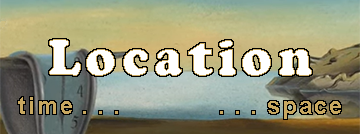



The four basic limiting characteristics of language, (objectification, linearity, abstraction and subjectivity), combine in various ways to produce further (composite) limitations.
The principles of objectification, referring to something using a noun, gives rise to the notion that something exists somewhere — a location in space.
Think of the notion of a pebble. We may merely hold the notion of a pebble in our mind, but our conception is based on our experience of pebbles located on a river bank or on a beach etc. There is always the implicit notion that pebbles exist somewhere in space.

A pebble is a piece of rock, and could be expected to endure for a long time. But a pebble could be crushed in a mill into gravel or rock dust. So a pebble that was existing (in the past), no longer exists. The 'lineal' sequence of the pebble's existence has come to an end.

This is the second aspect of 'location': everything that exists, has existed, or will exist, does so in a continuum we call 'time'.
Like the other limitations, location in time and space, improves our chances of staying alive and reproducing. You hear and see the speeding car and quickly gain the safety of the footpath. However, because the notions of time and space are intrinsic to our language, it is difficult, if not impossible, to discuss (or describe) various metaphysical concepts.
For thousands of years, philosophers have struggled to express in language, any notion of a realm beyond time and space. Even the notion of infinity carries with it a notion of an endless time scale. How do you describe something beyond the bounds of space and time using words that have time and space built into their logical structure?
The classic discussion of the difficulty is recorded in the dialogue 'Parmenides' written by Plato c.370 B.C. Plato promoted the notion of a transcendent world of forms, where ideas existed in their pure form, but they assumed less pure instantiations in the physical world of time and space. (See Plato essay.)
Socrates is discussing 'greatness' with Parmenides, who observes that if the perfect form of greatness existed in the transcendent world of forms and was simultaneously represented in a corrupted form in multiple instances in the material world, it would be in a state of separation from itself, and thus not a perfect form. So one would have to conceive of a 'third man', or higher level form of 'greatness' to unify the concept again. This of course would lead to a further separation, and obviate yet another and higher level 'third man', and on, ad infinitum.
It is one of the great discussions of the classical age, and the original passage is worth reading: link.
Plato suggests an analogy with 'day', or 'daylight':

‘... but the idea may be like the day which is one and the same in many places at once, and yet continuous with itself;’

But the discussion remains unresolved, [I maintain], because the factors of 'location' (in time and space) are being applied to a concept that is purported to exist in a transcendent realm beyond time and space: the transcendent world of forms is being presumed to exist 'somewhere' that is physically different to the corrupt instances observed in the physical world. The notion of a level of existence that is everpresent physically and temporally is just too hard to understand given the inherent implications of time and place in language itself.
* * * * *
Limiting Factors of language
| Language Logic | |
| Basic | |
|
Objectification Linearity Abstraction Subjectivity |
|
| Composite | |
| Location (this page) | |